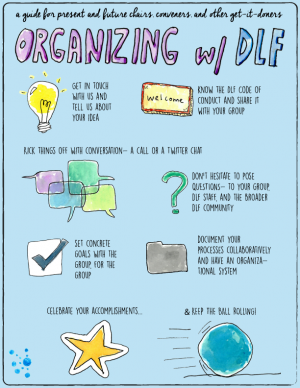Talking and Writing: Difference between revisions
No edit summary |
|||
| Line 3: | Line 3: | ||
'' | '' | ||
|} | |} | ||
[[File:Organizing-with-DLF.png|thumb]] | |||
== Discussion Lists == | == Discussion Lists == | ||
For very large group discussions, DLF supports listservs. Just ask us about setting one up. Many of our teams, however, prefer to create and manage their own Google Groups. (A tip from organizers: Google Group subscriptions default to no mail. Be sure your new subscribers adjust their settings to receive communications—or that you adjust them for them!) Finally, some DLF groups are setting up Slack spaces or channels within existing Slacks. If you do, let us know, so that we can join and help promote. | For very large group discussions, DLF supports listservs. Just ask us about setting one up. Many of our teams, however, prefer to create and manage their own Google Groups. (A tip from organizers: Google Group subscriptions default to no mail. Be sure your new subscribers adjust their settings to receive communications—or that you adjust them for them!) Finally, some DLF groups are setting up Slack spaces or channels within existing Slacks. If you do, let us know, so that we can join and help promote. | ||
Revision as of 09:54, 28 August 2018
| “It helps [motivation] to keep people focused on generating outcomes that will help them in their careers and get them visibility.” —Jody DeRidder
|

Discussion Lists
For very large group discussions, DLF supports listservs. Just ask us about setting one up. Many of our teams, however, prefer to create and manage their own Google Groups. (A tip from organizers: Google Group subscriptions default to no mail. Be sure your new subscribers adjust their settings to receive communications—or that you adjust them for them!) Finally, some DLF groups are setting up Slack spaces or channels within existing Slacks. If you do, let us know, so that we can join and help promote.
We’re also open to assisting with and promoting the use of other systems. Have an idea for a better way to communicate? Contact us!
Collaborative Editing
Whether it’s a meeting agenda or set of minutes, a white paper, a blog post, or a CFP, you have many tools at your disposal for writing and editing as a group. These include: this very DLF wiki (you can freely create new accounts and set up pages), Google Drive (for self-managed documents and spreadsheets), and Github (either managed independently or—for sustainability—in collaboration with CLIR/DLF).
- Google Drive
- CLIR/DLF GitHub
- Group Writing - The Writing Center at UNC Chapel Hill
- Seven Ways to Use Github That Aren’t Coding - readwrite
- GitHub, Academia, and Collaborative Writing
- Help:Contents - MediaWiki (your entry point for using the DLF wiki)
Table of Contents
- About DLF and the Organizers' Toolkit
- Working with Team DLF
- Starting a New Initiative or Working Group
- General Facilitation and Goal-Setting
- Facilitating for Diversity and Inclusion
- Communications and Consensus
- Preventing and Managing Burnout
- Gathering Info/Building Enthusiasm
- Planning an In-Person Meetup
- Setting Up Year-Round Meetings
- Planning Virtual Meetings and Webinars
- Talking and Writing
- Organizing and Sharing Your Work
- In a Nutshell

